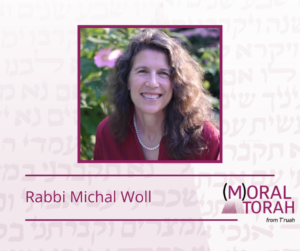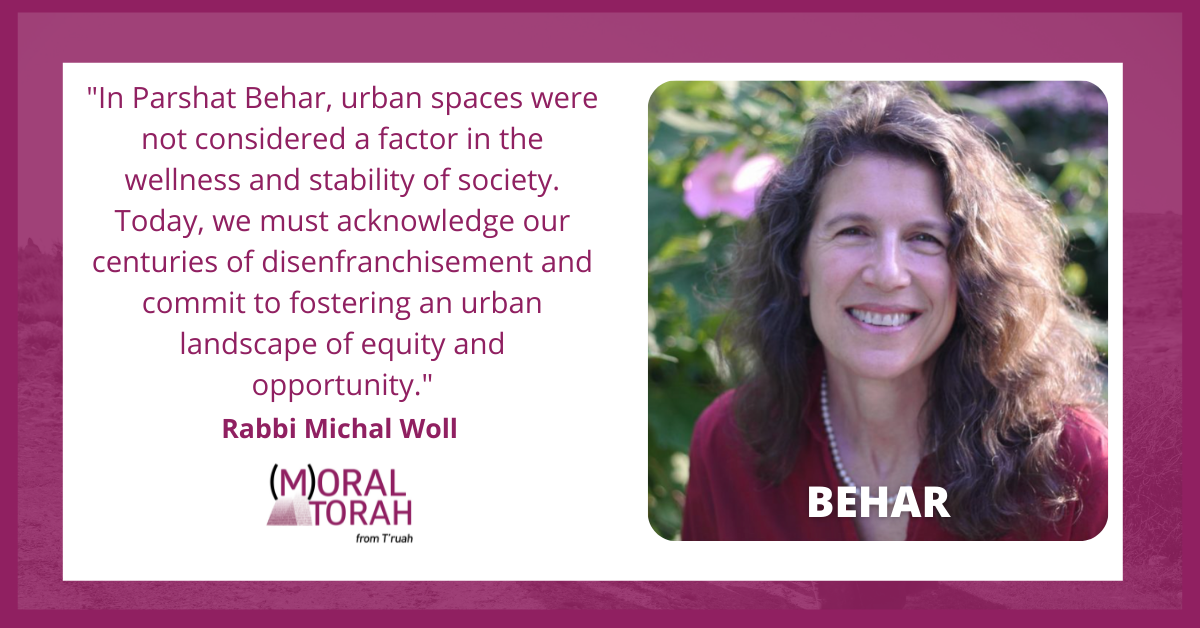A D’var Torah for Parshat Behar by Rabbi Michal Woll
SELL YOUR HOUSE “AS-IS”
no repairs no updates no stress
The small blue sign has been tacked to a pole at the end of my exit from I-94 since I moved into Milwaukee proper, just over a year ago. While it is only one of the ubiquitous “We Buy Houses” postings seen throughout town, and throughout the country, this one feels personal to me, a reminder of why we chose to throw in our lot with the people of MKE.
Although this is a shmita [sabbatical] year, I am skipping right to the yovel [jubilee], the Torah’s every-50-years redemption of sold lands, and the return to tribal landholdings:
In this year of jubilee, each of you shall return to your holding… the land must not be sold beyond reclaim, for the land is Mine; you are but strangers resident with Me. Throughout the land that you hold, you must provide for the redemption of the land. (Leviticus 25:13, 23-24)
Sign up to receive (M)oral Torah in your inbox each week.
Both shmita and yovel are focused on the land. As Jews, rural farming occupies most of our historical imagination and the Torah’s legal attention. We tend not to think much about ancient urban life beyond Jerusalem, the cities of refuge, the walls of Jericho, and the special dispensation given to the Jews of Shushan (ouch!). So you may be surprised to discover the verses that follow:
If any party sells a dwelling house in a walled city, it may be redeemed until a year has elapsed since its sale; the redemption period shall be a year. If it is not redeemed before a full year has elapsed, the house in the walled city shall pass to the purchaser beyond reclaim throughout the ages; it shall not be released in the jubilee. (Leviticus 25:29-30)
Why the dichotomy between rural and urban property? The 12th century commentator Nachmanides points to the primacy of agricultural holdings for the people’s sustenance and wealth, citing Kohelet 5:8: “Humanity is servant to the field.” After a year, he states, the sale of the urban property “does not bother him or do harm.”
In post-biblical history, however, Jews were often excluded from land ownership, becoming urban folk with urban professions by necessity. It is only in recent times, with the movement of Jews to suburban areas, that many of us became disconnected from the city as well.
Those of us who are engaged in learning to dismantle racism are likely familiar with how governments and banks have limited people of color from purchasing property and/or choosing where they would live. We may be less quick to remember that the same policies once applied to Jews, but some of our parents or grandparents recall those times. While this redlining is now but a memory for most of the Jewish community, it has created lasting personal and communal damage to communities of color historically unable to acquire property or build wealth for their families.
Find more commentaries on Parshat Behar.
Milwaukee is the second least equitable city in the nation for home ownership. From my highway exit, I head east through one of the roughest areas of town before crossing the color line, two and a half blocks from my home. Property values prior to crossing Holton Avenue are a fraction of those to the east. The percentage of owner occupied units is also low, decimated by the subprime mortgage crisis and housing crash of the late 2000s. Rents, however, are not proportionally affordable, with absentee landlords — often large corporations with significant financial power and little concern for the city or its people — making significant profits. The remaining owners are the primary targets of “ugly house” buyers, who focus on these vulnerable neighborhoods, eager to convert a property to a lucrative rental or profitable “flip.”
How can we help? Our local Habitat for Humanity is currently working to stabilize this neighborhood with affordable homes. Every project requires a subsidy, as it is impossible to build a home for the ultimate, very low appraised price. Governments need to step up with incentives to build as well as a lifting of restrictions on size and types of housing allowable in challenged areas. Habitat is a participant in Milwaukee’s new private/public Community Development Alliance, developed to promote affordable home ownership, stabilize rentals, and preserve communities.  This needs to happen in parallel to supporting a return of business and services to these same neighborhoods.
This needs to happen in parallel to supporting a return of business and services to these same neighborhoods.
In Parshat Behar, urban spaces were not considered a factor in the wellness and stability of society. Today, we must acknowledge our centuries of disenfranchisement and commit to fostering an urban landscape of equity and opportunity. Whether through politics, organizations, philanthropy, or swinging a hammer, everyone can support the creation of heritable homes and thriving neighborhoods.
Rabbi Michal Woll, a graduate of the Reconstructionist Rabbinical College, serves as rabbi of Congregation Shir Hadash, the only non-Orthodox synagogue within the Milwaukee city limits.

